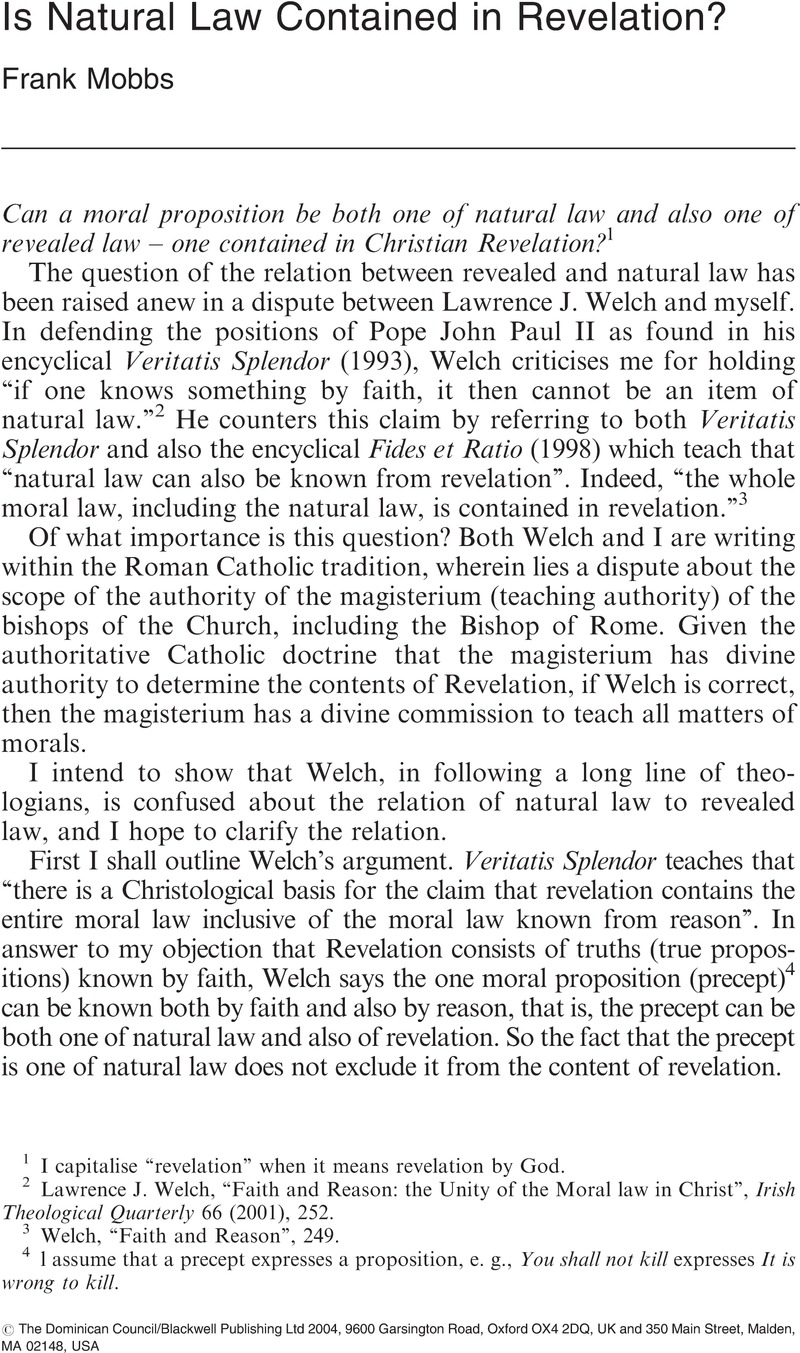Article contents
Is Natural Law Contained in Revelation?
Published online by Cambridge University Press: 01 January 2024
Abstract

- Type
- Original Articles
- Information
- Copyright
- Copyright © The Dominican Council/Blackwell Publishing Ltd 2004
References
1 I capitalise “revelation” when it means revelation by God.
2 Welch, Lawrence J., “Faith and Reason: the Unity of the Moral law in Christ”, Irish Theological Quarterly 66 (2001), 252CrossRefGoogle Scholar.
3 Welch, “Faith and Reason”, 249.
4 l assume that a precept expresses a proposition, e. g., You shall not kill expresses It is wrong to kill.
5 Summa Theologiae(ST) I-II, 100, 1
6 Aquinas at times distinguishes sharply what can be known by reason from what can be known from Revelation: “…therefore is necessary that, in addition to the natural law and human law, man should be directed towards his proper end by divine law”(ST 1–11, 91, 4). He goes on to say of “divine law” that it is divided into the old law and the new, that is, it is contained in revelation as recorded in the Christian Scriptures (ST I-II, 91, 5).
7 VS, 43. Cf. 44: natural law is “none other than human reason itself”(a quotation from Pope Leo XIII's encyclical, Libertas Praestantissimum), and VS 74: “.. the moral order, as established by the natural law, is in principle accessible to human reason”. These popes are repeating Aquinas.
8 VS, 44.
9 May, William E., An Introduction to Moral Theology(Huntington, IN: Our Sunday Visitor, 1991), 40Google Scholar.
10 VS, 44.
11 Dogmatic Constitution on the Catholic Faith, Dei Filius, DS 3008. The Council went on to add a canon: “If anyone should say that divine faith is not distinguished from natural knowledge of God and of moral matters[de Deo et rebus moralibus], and therefore that it is not requisite for divine faith that revealed truth be believed because of the authority of God, who reveals it, let him be anathema”, (DS 3032 – my emphasis). Pope John Paul II has insisted on this very distinction in his 1998 encyclical, Fides et Ratio, art. 15: “…the truth made known to us by Revelation is neither the product nor the consummation of an argument devised by human reason”.
12 VS, 44.
13 For an explication of the concept of believing someone, see Anscombe, G. E M., “What Is It to Believe Someone?”, in Rationality and Religious Belief, edited by Delaney, C. F. (Notre Dame: University of Notre Dame Press, 1979), 141–151Google Scholar.
14 Cf. Blanco, Arturo, “La revelación como ‘locutio Dei’ en las obras de Santo Tomas de Aquino”, Scripta Theologica 13 (1981), 9–61CrossRefGoogle Scholar.
- 1
- Cited by


